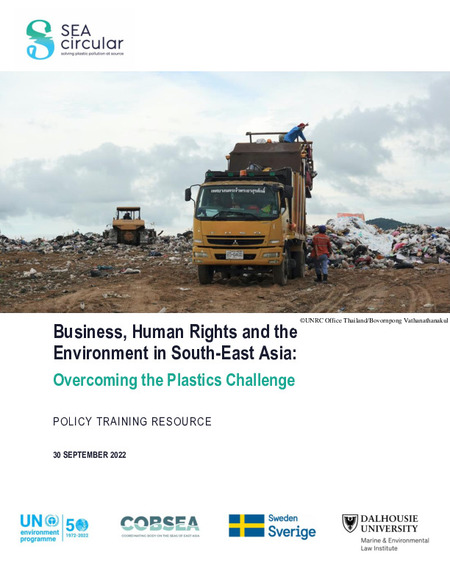Business, Human Rights and the Environment in South-East Asia: Overcoming the Plastics Challenge - Policy Training Resource

Date
2022-09Author
Dalhousie University
Citation Tool
Bibliographic Managers
RT Generic T1 Business, Human Rights and the Environment in South-East Asia: Overcoming the Plastics Challenge - Policy Training Resource A1 Dalhousie University, YR 2022-09 LK https://wedocs.unep.org/20.500.11822/41852 PB AB TY - GEN T1 - Business, Human Rights and the Environment in South-East Asia: Overcoming the Plastics Challenge - Policy Training Resource AU - Dalhousie University, Y1 - 2022-09 UR - https://wedocs.unep.org/20.500.11822/41852 PB - AB - @misc{20.500.11822_41852 author = {Dalhousie University, }, title = {Business, Human Rights and the Environment in South-East Asia: Overcoming the Plastics Challenge - Policy Training Resource}, year = {2022-09}, abstract = {}, url = {https://wedocs.unep.org/20.500.11822/41852} } @misc{20.500.11822_41852 author = {Dalhousie University, }, title = {Business, Human Rights and the Environment in South-East Asia: Overcoming the Plastics Challenge - Policy Training Resource}, year = {2022-09}, abstract = {}, url = {https://wedocs.unep.org/20.500.11822/41852} } TY - GEN T1 - Business, Human Rights and the Environment in South-East Asia: Overcoming the Plastics Challenge - Policy Training Resource AU - Dalhousie UniversityDalhousie University, UR - https://wedocs.unep.org/20.500.11822/41852 PB - AB -View/Open
Item Statistics
Display item statisticsMetadata
Show full item recordDescription
The trainings on Business, Human Rights and the Environment: Overcoming the Plastics Challenge are designed to build the capacity of actors in South-East Asia to support a human rights-based and gender equality approach to responsible business plastics action. The overarching aim of the trainings is to enable businesses and governments, as well as civil society, to become
champions of human rights responsible plastics transition. This policy training resource is designed to be used in two different ways. It may serve as a ‘train the trainer’ resource, supporting those who deliver trainings. The trainings are designed with three different audiences in mind: 1. Businesses and industry associations; 2. Governments (e.g. representatives of COBSEA national focal agencies); and 3. Civil society actors (e.g. SEA circular project partners).
Collections
Document Viewer
To read more, scroll down below.

